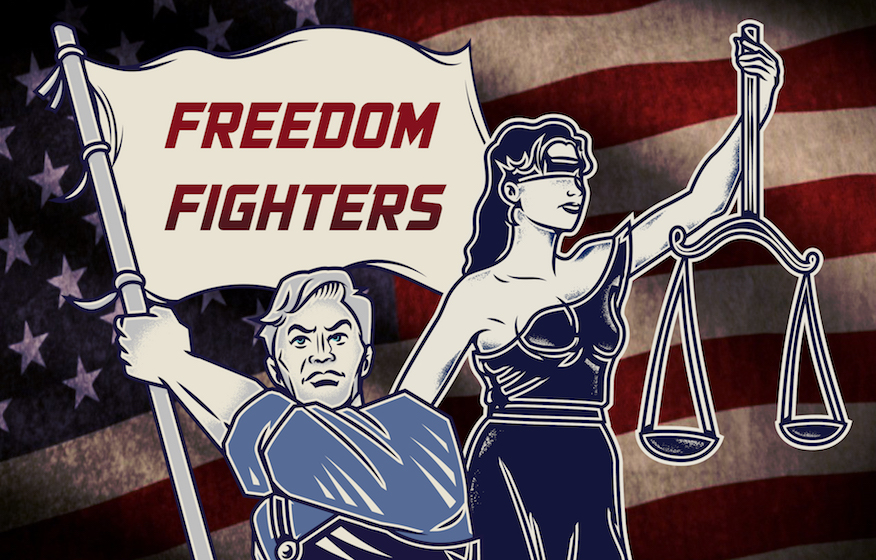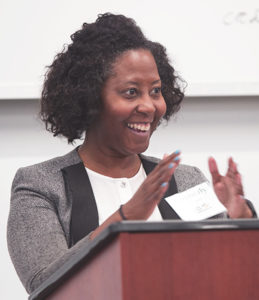Legal Freedom Fighter Series: Kimberly Merchant

We’ve seen it repeatedly throughout our history: When people’s rights are threatened, it’s the lawyers who step up to the plate. They fight hate, they defend our Constitution, and they give a voice to people who can’t speak for themselves. More than ever before, we need lawyers to help ensure that everyone’s rights are protected. Thousands of lawyers across the country are doing this. However, some are true Freedom Fighters and they deserve special recognition. That’s why each month, we will feature a lawyer who is really making a difference.
 Today, we are proud to feature Kimberly Merchant.
Today, we are proud to feature Kimberly Merchant.
Kimberly was recently named the first-ever Racial Justice Network Director of the Sargent Shriver National Center on Poverty Law—a legal advocacy organization which provides national leadership in advancing laws and policies that secure justice to improve the lives and opportunities of people living in poverty.
Kimberly is a seasoned advocate and attorney with 20 years of experience of practicing law. After graduating from the University of Mississippi School of Law, she spent nearly a decade in civil litigation. She then moved her focus to the criminal sector serving as assistant district attorney in Washington County, where she served for five years and was honored with the “Spirit of Giving” Award for her passionate involvement with the rights of domestic violence victims.
Kimberly also serves on the Greenville Public School District Board of Trustees, which allows for a unique opportunity to provide a quality education for more Mississippi children.
Here’s the interview:
What inspired you to become a lawyer in the first place?
I was in the last year of study for my undergraduate degree in English when one of my professors inquired about my plans after graduation. I intended to pursue an advanced degree in English. She casually suggested that instead I apply to law school, so that’s what I actually wound up doing. What is inspiring about this story is how one teacher who believed in me as a student, even more than I believed in myself, set me on trajectory towards my purpose with a simple suggestion. This demonstrates the tremendous influence and power teachers have over our children and their success.
What was your most memorable case?
My most memorable case was when I represented a young man who was expelled from school for one year for the alleged possession of drugs. A classmate had passed him a balled-up paper towel and asked him to go to the restroom to see what was in it. Once my client realized the paper towel contained drugs, he promptly went back to his classmate and returned the paper towel. A teacher observing this interaction asked both students to bring the paper towel to her; she discovered it contained drugs and sent them both to the office. During the course of its investigation, the school reviewed video footage of the interaction and took statements from both students. The classmate admitted the drugs were his; however, the school expelled both students.
I challenged the expulsion. This was the first of many challenges I have made to the practice of expelling students with little or no evidence. Ultimately, the expulsion was reversed, the infraction was removed from the student’s record, and the school was required to allow the student to make up all missed assignments and to provide tutorial services. This case is especially memorable because if the expulsion had been upheld, my client would have failed the eleventh grade and would have had to repeat it. However, not only was he able to graduate with his class, he has since graduated college and is father with a successful career.
From an equal rights and racial justice perceptive, where do we stand today compared to previous years and decades?
There has been a gap in progress on civil rights since the late 1980s. As attorneys began to successfully litigate violations of race discrimination in employment, voting, education, housing, and other areas, intense scrutiny on the policies and systems that impede equity and racial justice began to wane. As explicit discrimination and racism became unacceptable, systems began to adjust and found avenues to perpetuate the same result in less obvious ways.
However, following the election of President Barack Obama and the highly publicized deaths of black men at the hands of law enforcement—which opened up a broader conversation on race—the nation began to discuss and acknowledge the inequities and discrimination still experienced by people of color. Although there were clearly many successes during the civil rights era, we have essentially “come full circle” to find that we still have so much work to do.
It is more important than ever to understand how to affirmatively advance race equity. That’s why the Sargent Shriver National Center on Poverty Law launched the Racial Justice Training Institute four years ago. RJTI is a national leadership program that trains advocates to address the impact of structural racialization in housing, education, employment, healthcare, and more, and ensure that race is considered foremost in efforts to eradicate poverty.
RJTI has cultivated more than 100 advocates in 23 states. These freedom fighters, whom I will be privileged to work with in my new role as Racial Justice Network Director, are not only challenging race-based inequities. They are changing outdated jurisprudence and forcing today’s courts to adjust in ways that address the unique and various forms that injustices take on in today’s society.
What challenges do you face today that you never encountered before?
I did not anticipate the level of push back from teachers and administrators when it came to the success of students. When I began representing parents and students in school disciplinary matters, I naively believed that school districts would understand that parents want the same thing they did—for students to be successful. As I began to challenge the policies and practices that push students out of school and exclude them from the educational system, I understood the importance of leading this work with a racial equity lens.
When I participated in the Racial Justice Training Network as a fellow, I was introduced to concepts like structural racialization and implicit bias. These innovative theories resolved the mystery of why students of color experienced such disparities in outcomes. I began to understand that fundamental concepts like “student success” did not apply to all students. To appreciate the true cause of these disparities and disproportionate outcomes, I had to gain a deeper understanding of social cognition and how perceptions and ideas learned through individual experience impacted outcomes for students. Most importantly, I had to come to grips with the reality that these perceptions even impacted how teachers and administrators of color treat students that looked like them, which plays a critical role in causing these disparities. This was a new challenge that I was not prepared to encounter or face when I began to do this work.
You’ve had so many successes. Which one (or ones) stands out the most for you?
The success that stands out most for me is the development and implementation of the Sunflower County Systems Change Project. After spending years representing parents and students challenging exclusionary and punitive policies that remove children from the educational setting in school districts throughout Mississippi , I decided to take an innovative systems approach to the problem. In partnership with a local school district, I piloted a program that examined and assessed three systems that impacted outcomes for young men of color in Sunflower County. In conjunction with community stakeholders, we reviewed and proposed changes to policies in the school system, the juvenile justice/law enforcement system, and the media to change how we engaged and perceived young men and boys of color.
This project stands out for me because it was my first and most successful attempt to challenge and change policy and systems without actually using my legal degree.
If you could give one piece of advice to other lawyers across the country, what would you say?
I would remind them of the power of community. As legal advocates, we have been trained to review and access issues from all angles in an effort to determine the best route for success. Unfortunately, this process does not include the wisdom of community. Before engaging in any social change/justice work, attorneys must remember to work in partnership with communities.
If an attorney wants to get involved in social justice, how can they get started?
Any attorney who wants to get involved in social justice should first determine what issue speaks to their values. Then they should find an organization doing that work and volunteer both their expertise and time. Most organizations doing this work need additional capacity that can easily be gained through the generosity of volunteerism. Also, the Clearinghouse Community is a good place to connect with other attorneys interested in social justice and to learn more about the issues facing people living in poverty.
Share post:








